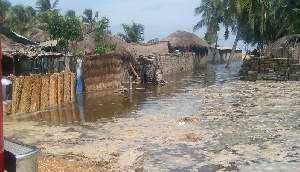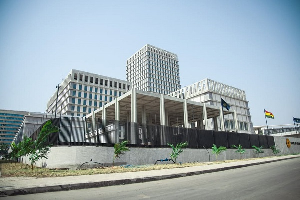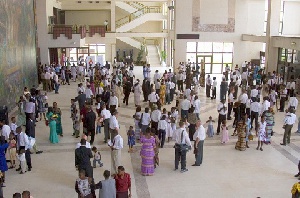GhanaWeb Feature by Joycelyn Kyei Baffuor
Coastal erosion has devastated numerous fishing villages along Ghana's coastline for years, causing significant damage to properties and displacing thousands of residents.
The situation is particularly dire in some parts of the Volta Region, Ada in the Greater Accra Region, and Shama Anlo Beach in the Western Region, where communities are constantly battling the effects of rising sea levels and tidal waves.
The government's efforts, including the Keta Sea Defence Project, have provided some positive results; however, the high cost of replicating such projects across other coastal areas raises concerns about their long-term sustainability.
The Minister for Works and Housing, Kojo Oppong-Nkrumah, has assured that the government is committed to expediting the completion of Ghana’s sea defence projects.
He stated that most of the coastal protection projects that commenced in 2018 are near completion but have slowed down due to financial constraints.
During a recent tour of the Anomabo, Cape Coast, and New Takoradi Emergency Sea Defence Project (Phase III) at Elmina, where there is the construction of armour rock revetment with granular filter layers, armour rock groynes, and land reclamation with lateritic backfilling to protect 5,000 metres of the coastal stretch, Kojo Oppong-Nkrumah expressed satisfaction with the level of work done by the contractors and said the project will help protect lives and properties in the communities.
“We’re doing about 8 coastal protection projects across the country since 2017, and a good number of them have been completed; some have been delayed as well. What the Ministry and the Hydro Authority are doing is touring these projects to understand the challenges, why some of them haven’t been completed, and for those that are near completion, to be able to fast-track the work. I think the contractors have done very well. The Hydro Authority too has done very well,” he said.
In Takoradi, he inspected the Shama, Aboadze, Axim, and Dixcove sea defence projects, where he instructed the contractor, Messrs Xara Developers Limited, to hasten construction works, which stand at 66% completion.
During his visit to Dixcove, the Paramount Chief of Upper Dixcove Traditional Area, Obrempong Hema Dekyi, bemoaned how the slow pace of construction works puts the community at the mercy of tidal waves.
Ongoing challenges in affected communities
In the Volta Region, over 15 communities in the Anloga District, Ketu South Municipality, and Keta Municipality continue to suffer the devastating impact of tidal waves.
The situation was so severe that on May 15, 2024, Members of the Parliamentary Select Committee on Works and Housing toured these areas to observe the destruction firsthand. The committee's chairman, Isaac Kwame Asiamah, emphasised the need for immediate measures to save the coast, warning that the erosion posed a serious threat to the communities and their livelihoods.
The Member of Parliament for Dormaa West, Vincent Oppong Asamoah, stressed the urgent need for the government to prioritise issues relating to coastal devastation.
"Coastal erosion poses a significant threat to our communities and livelihoods. It is imperative that the government takes decisive action to prevent further deterioration and safeguard our coastal areas," he noted.
The Member of Parliament for Ho West, Emmanuel Bedzrah, also called for swift action to address the challenges faced by coastal communities. "The plight of our coastal communities cannot be ignored. We must act decisively to provide relief and support to those affected by coastal devastation," he added.
The legislators stressed the importance of collaboration between the government, local authorities, and community stakeholders to implement effective measures for coastal protection and resilience.
In Ada, the communities along the coastline of the Ada West District are also hit hard by perennial tidal waves, with the situation worsening each year. The destruction of homes and fishing areas has left residents displaced and struggling to maintain their livelihoods.
Assembly members in the Ada West District of the Greater Accra Region, whose electoral areas are along the coastline, have expressed concern about how successive governments have neglected communities ravaged by the sea despite numerous calls for action.
According to them, the high current from the sea annually moves over its banks to submerge the towns, destroying properties and leaving the residents of the communities in fear and danger.
The assembly members, who revealed that the situation is unpredictable as it occurs periodically, have entreated the current government to channel the state’s resources into constructing sea defences in the coastline communities.
Ahuakese Joseph Rockson Mawusuor, the assemblyman for Lolonya Electoral Area, has appealed to the government to come to their aid.
“At Lolonya particularly, the sea has gradually washed away the vast shore, so it easily flows to the bare land occupied by the people. It is unfortunate to see people displaced from their rooms every year, yet the state is mute over this,” he narrated.
He continued that the challenge, in its occurring times, adversely affects economic activities in the area, subjecting the victims to several hardships.
“Both men and women survive on fishing, which is the main occupation of my people. Anytime the sea ravages the town, the fishermen usually have their canoes destroyed by the sea waves while business engagement comes to a halt. This is also a sad moment to watch,” he described.
The assemblyman for the Akplabanya Electoral Area, Wilfred Ahuma Ocansey, has expressed disappointment in political parties using the tidal wave predicament affecting the coastline communities as a political message in election years but later turning to ignore the communities.
Asked if relocating the community is the best option, he said the government cannot relocate the entire Akplabanya community or other affected communities along the coastline away from their present locations as a means to save the occupants.
“We don’t farm, and we don’t mine salt as well. Our main work is fishing, and relocating this community to a new settlement means we need to start a new life, which looks quite impossible because we have settled here for years and depended on the fishing job as a way to survive,” he stated.
On August 7, 2024, at Anlo Beach in the Shama District of the Western Region, over 500 houses have been destroyed by tidal waves, forcing many residents to live in fear as their homes are gradually eroded into the ocean. The community, heavily reliant on fishing, has seen its shoreline erode to the point where residents can no longer cast their nets effectively, putting their livelihoods at risk.
Residents in these affected communities are eagerly anticipating the completion of the ongoing coastal protection projects aimed at bringing them much-needed relief from the devastating effects of coastal erosion.
The project’s success is crucial for their well-being and livelihoods, as they have been struggling with the consequences of beach erosion for far too long.
Watch the latest episode of Everyday People below:
General News of Saturday, 31 August 2024
Source: www.ghanaweb.com













